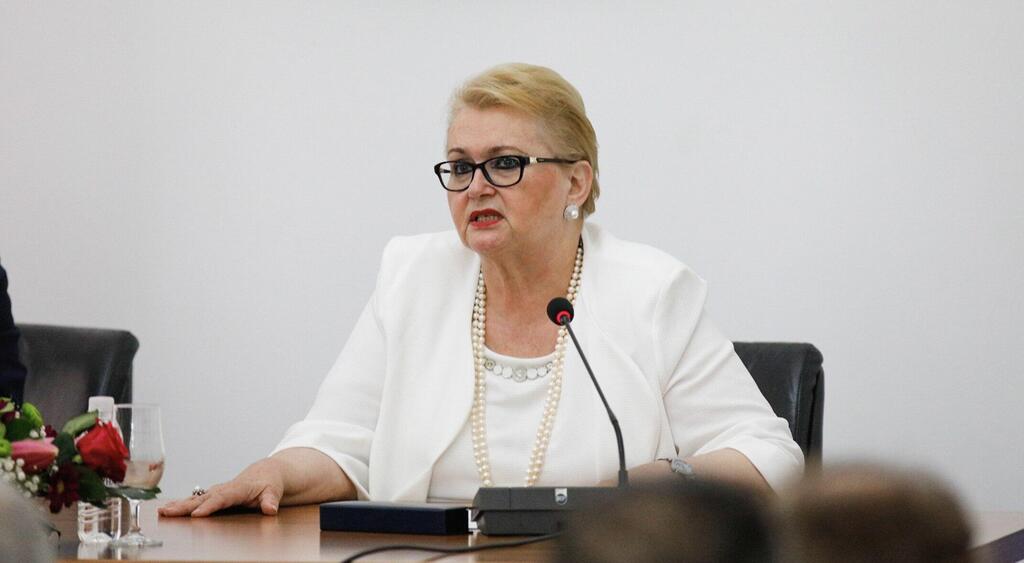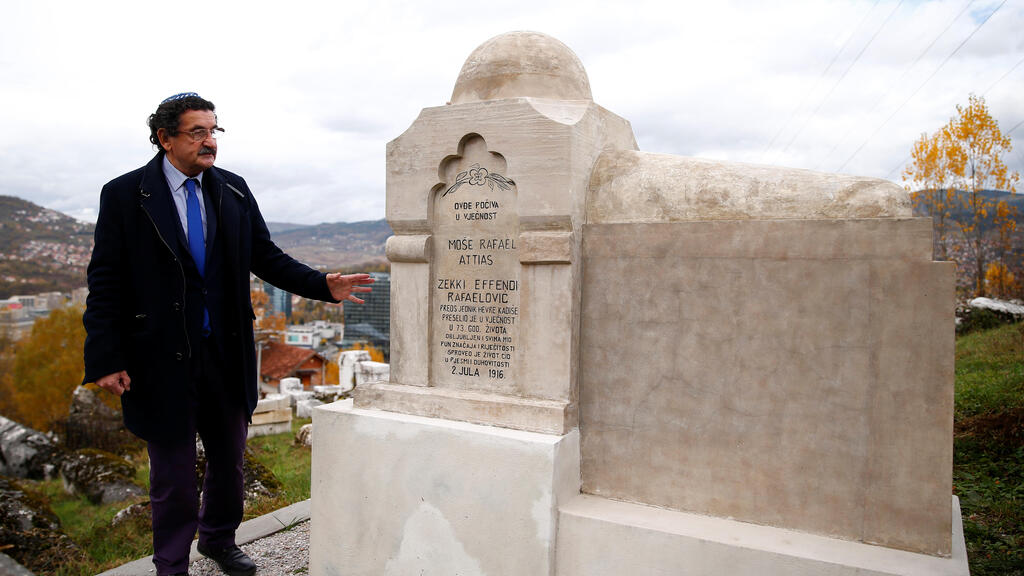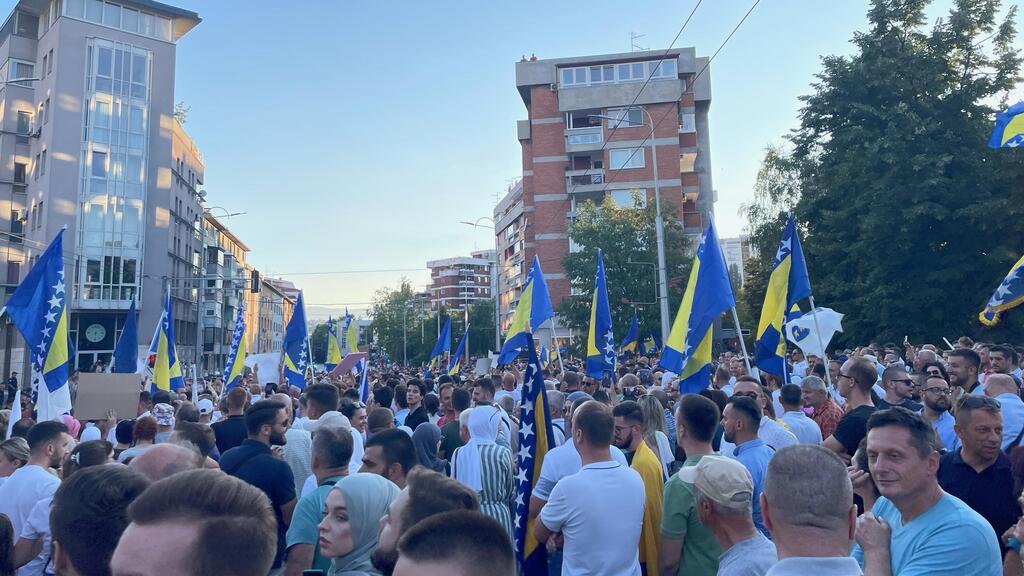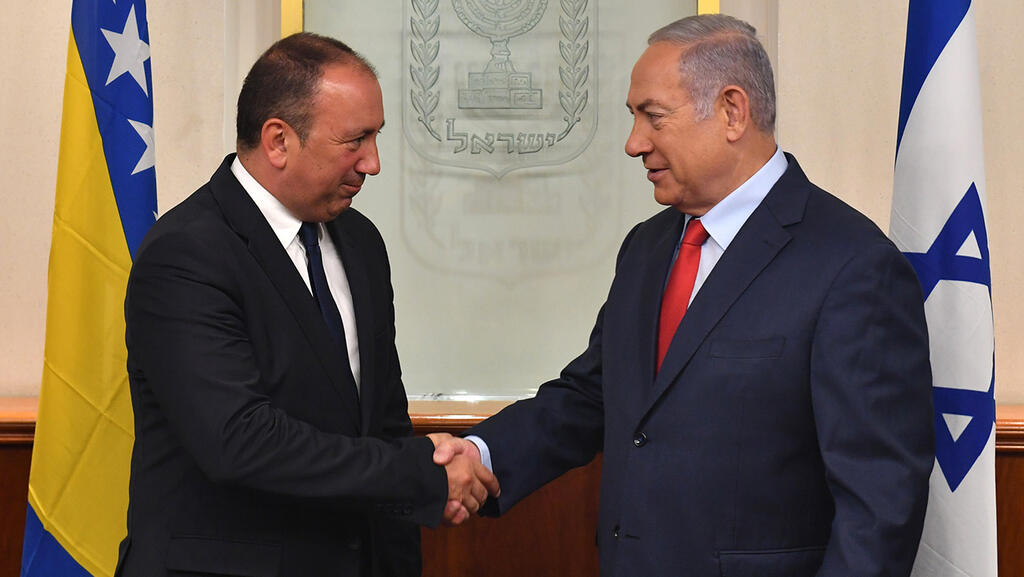Last month, Jewish leaders in Sarajevo joined widespread condemnation of a proposed law that could further distance Jews and other minorities from positions of political power. Now a leaked document from the Israeli embassy in Albania, which also serves Bosnia and Herzegovina, shows that the Israeli government backs the controversial plan.
“The readiness and proposals of the Croatian side, which arrived during the negotiations on changes to the electoral law, are welcome,” read the Israeli memo, which began circulating on Monday.
4 View gallery


Bosnian Foreign Minister Bisera Turkovic
(Photo: Elman Omic / Anadolu Agency via Getty Images)
While most ethnonationalist parties support the proposition, many prominent Bosnian politicians do not, and the leak created a political storm.
“It is hard to fathom how the official policy of the State of Israel could be to welcome the discrimination of Jews in not being able to hold office in Bosnia and Herzegovina,” said Bosnian Foreign Minister Bisera Turkovic, according to Haaretz. “The proposed electoral legislation would cement the current discriminatory system towards minorities in Bosnia.”
“We can safely say that this has hurt Israel’s image among the Bosniak population. It came out of left field,” said former Bosnian Energy Minister Reuf Bajrovic.
The plan has been most vocally backed by Dragan Čović, the head of the Croatian Democratic Union (HDZ), a Croat political party in Bosnia. Milorad Dodik, the Bosnian-Serb member of the country’s tripartite presidency, and his SNSD party also stand to benefit from the new law. Both Čović and Dodik have also been outspoken supporters of Israel.
In the same memo, the Israeli embassy also expressed gratitude for the country’s adoption of the IHRA definition of antisemitism last month — a move that was pushed by both Čović and Dodik — as well as the removal of street names honoring Nazi figures and local WWII era collaborators in the city of Mostar.
“The State of Israel supports the recent steps taken by various institutions of Bosnia and Herzegovina, which benefit all its citizens and its Jewish community, and hopes that these steps are an expression of a welcoming trend,” the statement reads.
However, both Čović and Dodik have been criticized for their denial of atrocities that were perpetrated by members of their respective ethnic groups during the Bosnian war, including the Srebrenica Genocide, which took place in an area under Dodik’s jurisdiction in the Bosnian-Serb enclave, Republicka Srpska.
Čović has also been accused of ordering the use of slave labor from a prison in a factory in Mostar that he ran in the 1990s. He has denied the claim, but representatives of survivors of the camp wrote to the Israeli ambassador in Albania, Noah Gal Gendler, to criticize him over his support of Čović’s proposal.
“For the government of Israel to come out and say this is, in my view, crazy. It’s seen as Israel siding with people who want Bosnia gone, far-right genocide deniers,” Bajrovic said.
Israel ultimately offered a clarification of its position, after Turkovic sent a diplomatic request for one.
“The Israeli embassy in Tirana, which is also responsible for Bosnia and Herzegovina, issued a document [on Monday] in which it expresses the support [for] the preservation of the rights of the Jewish community in the country. The document was sent following a local initiative to change the election law and the fear that the implications of the discussion around this change might harm those rights,” the Israeli embassy’s statement said. It did not elaborate on how the bill would preserve the rights of Jewish people in Bosnia.
Under Bosnia’s electoral system, which was established at the end of the Balkan state’s brutal war following the breakup of Yugoslavia in the 1990s, high level political positions are distributed equally among three “constituent peoples”: Bosniaks, Serbs and Croats. As a result, Jews and other national minorities that fall outside of those three groups cannot run for offices ranging from the tripartite presidency to the upper chamber of Bosnia’s parliament — the House of Peoples — as well as countless other local roles.
Though only around 900 Jews live in Bosnia and Herzegovina, the majority of whom reside in Sarajevo, it is estimated that at least 400,000 residents, including Bosnia’s 60,000 Roma citizens, are barred from high level political roles under this system.
As part of the peace agreement that ended the 1990s war, Bosnia’s government is also overseen by a High Representative, an unelected official traditionally selected from the European Union who wields broad power. The Office of the High Representative proposed the new law last month, which would redistribute the ethnic representatives amongst the country’s cantons, or districts. Previously, each canton elected a representative from each ethnicity; the new system would move ethnic representatives from cantons with less than 3% of a given ethnicity to another one with a majority, consolidating their power in those areas.
In the mid-2000s, Jakob Finci, president of the Bosnian Jewish community, and Dervo Sejdic, a Roma leader in Bosnia, disputed Bosnia’s political system in a complaint to the European Court of Human Rights (ECHR). The court ruled in their favor, placing full political rights for minorities as a requirement for Bosnia’s candidacy as an EU member state — but no progress has been made to implement those rights in the years since the ruling.
Nearly 30 years after the end of the Bosnian war, many citizens also feel that that the age when local politics being divided on ethnic lines should be a thing of the past, and that moving towards a civic national identity as “Bosnian-Herzegovinians,” along with EU membership, should be the goal. The proposed bill would serve to further cement the current system, moving Bosnia farther from EU acceptance.
Despite the spat, Israel and Bosnia Herzegovina have had relatively warm relations since the Muslim-majority nation was solidified as an independent state in 1995.




